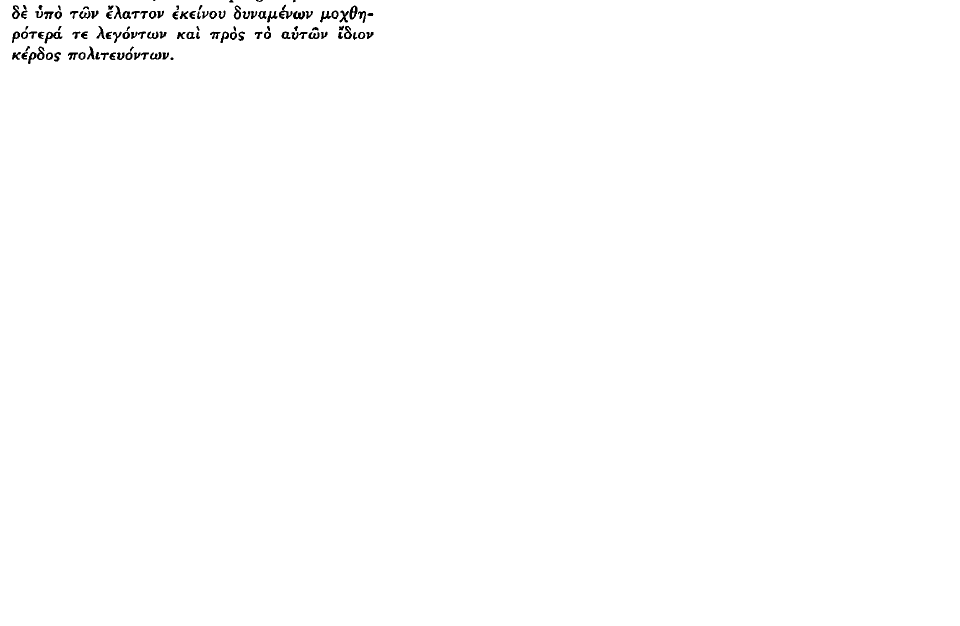Article contents
Thucydides 2. 65. 11
Published online by Cambridge University Press: 11 February 2009
Extract
In this celebrated sentence Thucydides gives his opinion more specifically than anywhere in the narrative of Books 6 and 7 on the reasons for the failure of the Sicilian expedition. Unfortunately, however, he expresses his views with some lack of clarity, and this has led to disagreement among modern scholars who have sought to determine precisely what he means. It is also unfortunate that he does not state the evidence upon which he bases his conclusion that the expedition failed because of struggles for political leadership at Athens. The main purpose of this paper is to consider the meaning and implications of this sentence, which can, I believe, be clarified by reference to other passages in which Thucydides uses  when debating the causes of past actions. A closely allied problem, that of the relationship between this sentence and the narrative of Books 6 and 7, will also be discussed. A. W. Gomme has maintained that this relationship throws some light upon the date of composition of Books 6 and 7. There is no doubt whatever that the sentence was written at or after the end of the Peloponnesian war (ibid. 12), and if there are differences of outlook, even inconsistencies, between it and the narrative which show that Thucydides cannot have written, or at any rate conceived, both at the same time, he almost certainly wrote the narrative before the end of the war.2 In my opinion there is inconsistency on one point only, but here the inconsistency is sufficiently marked to suggest not only that Books 6 and 7 were written considerably earlier than 2. 65. 11, but that they were written within the next few years after the conclusion of the Sicilian campaign.
when debating the causes of past actions. A closely allied problem, that of the relationship between this sentence and the narrative of Books 6 and 7, will also be discussed. A. W. Gomme has maintained that this relationship throws some light upon the date of composition of Books 6 and 7. There is no doubt whatever that the sentence was written at or after the end of the Peloponnesian war (ibid. 12), and if there are differences of outlook, even inconsistencies, between it and the narrative which show that Thucydides cannot have written, or at any rate conceived, both at the same time, he almost certainly wrote the narrative before the end of the war.2 In my opinion there is inconsistency on one point only, but here the inconsistency is sufficiently marked to suggest not only that Books 6 and 7 were written considerably earlier than 2. 65. 11, but that they were written within the next few years after the conclusion of the Sicilian campaign.
- Type
- Research Article
- Information
- Copyright
- Copyright © The Classical Association 1958
References
1 J.H.S. lxxi (1951), 72.Google Scholar Although I do not agree with his conclusions on some points, it will be seen that the latter part of my paper owes much to his brief but admirable dis cussion. See also the notes on this sentence in the second volume of his Historical Commentary on Thucydides ii. (1956), 195–6, which was published after the first draft of my paper had been completed.Google Scholar
2 Gomme, , loc. cit. (J.H.S.), concludes: ‘judgement and narrative were not written at the same time, in the same breath as it were, both in the mind of the writer all the time. The judgement is late; and the narrative presumably earlier.’Google Scholar
3 Steup, n. ad loc, rightly points out that this section refers principally to the Sicilian expedition, cf. Gomme, , op. cit. (J.H.S.) 71, and Commentary n. ad loc., who debates which other actions on the part of the Athenians Thucydides has in mind.Google Scholar
1 These are summarized at the beginning of 65. 7. To Thucydides the Athenians were virtually at war throughout the twenty-seven years from 431 to 404 (5. 26. 1–2), so that not even during the  was neglect of Periclean doctrines justifiable.
was neglect of Periclean doctrines justifiable.
2 Croiset, , n. ad loc., points out that 
 must be supplied as the antecedent.Google Scholar
must be supplied as the antecedent.Google Scholar
3 Gomme, n. ad loc.
4 de Romilly, J., Thwydide et l'impérialisme athénien (1947), 179 n. 4, states (rightly in my opinion) that  does not normally bear this meaning in Thucydides. She regards 1.9. 1 as an exception; I do not (see below), and Steup's note on this passage seems to me to be misleading.Google Scholar
does not normally bear this meaning in Thucydides. She regards 1.9. 1 as an exception; I do not (see below), and Steup's note on this passage seems to me to be misleading.Google Scholar
5 Cf. I. 9. 3,  where the influence of
where the influence of  is not wholly discounted.
is not wholly discounted.
1 Subsequent events proved that the posi tion of Pericles was not impregnable (2. 65- 3).
2 There is general agreement that after  some words have been lost referring to irregularity of payment (Steup, , Anhang 286–7).Google Scholar
some words have been lost referring to irregularity of payment (Steup, , Anhang 286–7).Google Scholar
3 Jones, A. H. M., Past and Present, i (1952), 16 n. 33 (on p. 28).Google Scholar
4 The phrase 
 in the above passage means only that the Athenians had learned from their past experience, which was greater than that of die Peloponnesians. It does not imply that the Athenian rate of pay for sailors had always been three obols. 3. 17. 4 suggests that the normal rate during the Archidamian war was a drachma. Thus the question whether or not the Athenians had in the past suffered from poverty does not arise, though there is evidence that they had in 428 (3. 13. 3 and 19. 1).
in the above passage means only that the Athenians had learned from their past experience, which was greater than that of die Peloponnesians. It does not imply that the Athenian rate of pay for sailors had always been three obols. 3. 17. 4 suggests that the normal rate during the Archidamian war was a drachma. Thus the question whether or not the Athenians had in the past suffered from poverty does not arise, though there is evidence that they had in 428 (3. 13. 3 and 19. 1).
1 2. 87. 4 
 5. 95
5. 95 

 and 6. 72.3
and 6. 72.3 
 are fundamentally different from the passages listed above; inter alia, in each instance the first of the two considerations weighed against one another is an acknowledged fact.
are fundamentally different from the passages listed above; inter alia, in each instance the first of the two considerations weighed against one another is an acknowledged fact.
2 Cf. Hdt. 7. 16 α 2 (which is not, however, closely parallel), and (much better) Dem. 4. 11,  (Philip)
(Philip) 


3 Examples are: Beloch, K. J., Gr. Gesch. ii 2. 1 (1914), 356 n. 1;Google ScholarFinley, J. H., Thtuy- dides (1942), 152Google Scholar (but cf. Han. Stud., Suppl. vol. i (1940), 286–7,Google Scholar where he expresses a different view); Schmid-Stahlin, , Gr. Litera- turgesch. i. 5 (1948), 97.Google Scholar I interpreted the passage in the same way in C.Q. xxxv (1941), 61.Google Scholar
4 Das Geschichtswerk des Thukydides 2 (1929), 241 n. 3.Google Scholar
5 Andoc. 3. 30; Isocr. 8. 84; Aeschin. 2. 76. It is immaterial that all these passages contain gross inaccuracies.
1 6. 20. 3 (speech of Nicias); 7. 55. 2, cf. 8. 96. 5.
2 The views ascribed to Demosthenes in 7. 42. 3, though Thucydides may have shared them, apply only to a particular situation which could hardly have been foreseen.
3 Arnold in his note on 2. 65. 11 cites 6. 31.6 and 7. 42. 3 (wrongly in my opinion) as evidence that Thucydides did not condemn the expedition on military grounds. Gomme, n. ad loc, takes the same view.
4 He may possibly have agreed with the view attributed to both Nicias (6. 11. 1) and Euphemus (6. 86. 3) that, even if the expedition were to achieve military victory, Sicily would be difficult to govern because of its remoteness from Athens and its large population.
5 Cf. Jowett, , n. ad loc., ‘these words seem to imply a neglect of the expedition which is scarcely indicated in Thucydides' own narrative’, and Gomme, n. ad loc.Google Scholar
6 Only the order given to Demosthenqs to raid Laconia in the course of his voyage (7. 20. 2) appears to merit criticism.
1 Plato, , Menex. 243 a, attributes the failure of the expedition to the difficulty of supporting it from home 

 but the value of this passage as his torical evidence is almost negligible.Google Scholar
but the value of this passage as his torical evidence is almost negligible.Google Scholar
2 So Poppo-Stahl, n. ad loc., 'mente repete  .
.
3 For the position of the negative cf. 3. 57. I, 
4 Possibly  may be adverbial and not the object of
may be adverbial and not the object of  For
For  cf. 1. 70. 2 and 3. 57. 1.
cf. 1. 70. 2 and 3. 57. 1.
5 Recently noted by de Romiily, J. in the Budé Thucydides, vol. iv (1955), Notice xiii-xiv.Google Scholar
6 Cf. also Xen., Hell. 1.4. 13 

7 Cf. Plut., , Alcib. 19. 1–3.Google Scholar
1 6. 15–4 will be considered below (n. 6).
2 His experience of military leadership before the Sicilian campaign seems to have been slight (5. 52. 2, 55. 4, 84. 1).
3 The plot to bring about the betrayal of Messana, which Alcibiades disclosed to the enemies of Athens just before he left Sicily (6. 74. 1), would, if it had been successful, have provided the Athenians with a stra tegically valuable base (6. 48, cf. 4. 1. 1–2), but its success was not assured.
4 Gomme, n. ad loc.: ‘at the most we can surmise that Alkibiades’ diplomacy might have won some successes and that when he found he could delay no longer he would have attacked with more vigour than Nikias’.
5 Andrewes, A., J.H.S. lxxiii (1953), 2–9Google Scholar shows how the military situation there was adversely affected by political friction between the fleet and the restored democracy. Hatzfeld, J., Alcibiade (1940), 288–9, contrasts the successes of Alcibiades with the failures of Athens elsewhere during this period.Google Scholar
6 6. 15. 4,  These words refer to the actions of Alcibiades between 411 and 407, as Gomme, , op. cit. (J.H.S.), 74, maintains, and not to those of 415. The passage to which the words be long is almost certainly a late insertion in Book 6.Google Scholar
These words refer to the actions of Alcibiades between 411 and 407, as Gomme, , op. cit. (J.H.S.), 74, maintains, and not to those of 415. The passage to which the words be long is almost certainly a late insertion in Book 6.Google Scholar
7 Alcib. 32. 4, cf. Nepos, , Alcib. 6. 2, which is doubtless derived ultimately from the same source.Google Scholar
1 Schwartz, , op. cit. 212–13;Google ScholarSchmid-Stahlin, , op. cit. i. 5. 96–97.Google Scholar I cannot agree with the conclusion of Gomme, , op. cit. (J.H.S.), 72,Google Scholar from 

 (8. 86. 4) that ‘Thucydides himself could not have thought much of his strategy in 415’, when he wrote Book 8. If
(8. 86. 4) that ‘Thucydides himself could not have thought much of his strategy in 415’, when he wrote Book 8. If  is the right reading, as seems likely, and the words mean that this was the first occasion on which Alcibiades had benefited Athens, Thucydides is being somewhat careless, as not infrequently in this book. He has omitted to insert some phrase limiting the application of this judgement to the immediate past: he is surely not giving a verdict on the whole previous career of Alcibiades but only on events of the last few months. He means that all the recent intrigues of Alcibiades had scarcely benefited his country but that here at least he was doing it a real service in successfully opposing the proposal to sail against the Four Hundred. Book 8 is remarkably self-contained, and references to earlier events are few.
is the right reading, as seems likely, and the words mean that this was the first occasion on which Alcibiades had benefited Athens, Thucydides is being somewhat careless, as not infrequently in this book. He has omitted to insert some phrase limiting the application of this judgement to the immediate past: he is surely not giving a verdict on the whole previous career of Alcibiades but only on events of the last few months. He means that all the recent intrigues of Alcibiades had scarcely benefited his country but that here at least he was doing it a real service in successfully opposing the proposal to sail against the Four Hundred. Book 8 is remarkably self-contained, and references to earlier events are few.
2 Cf. Meyer, E., G.d.A. iv 2. 2 (1956), 232–5.Google Scholar Laispodias, one of the commanders of the Athenian fleet, was accused of being a war monger and seems to have held radical views before he joined the Four Hundred (Kahrstedt, U., R.E. xii [1924], 517).Google Scholar
3 He can hardly have held this view when he wrote 7. 28. 3, and the same note of admiration for Athenian perseverance is struck in 2. 65. 12, though here he is writing of the period after the disaster in Sicily.
4 The absurd story of Plutarch (Nic. 20. 1) that the dispatch of a second armament to Sicily was delayed by leaders jealous of the success achieved by Nicias is palpably false.
1 I am grateful to Dr. G. E. F. Chilver and Dr. B. R. Rees, whose criticisms of this paper have been most valuable to me.
- 2
- Cited by


